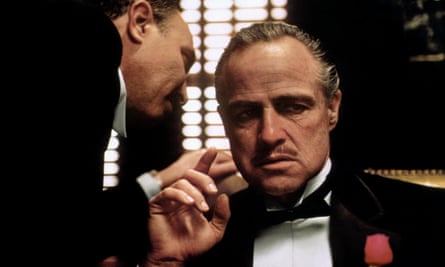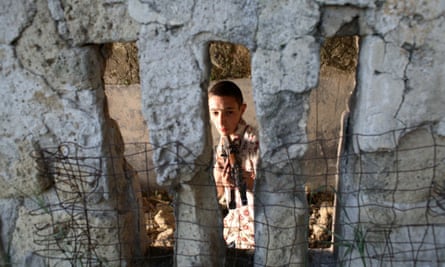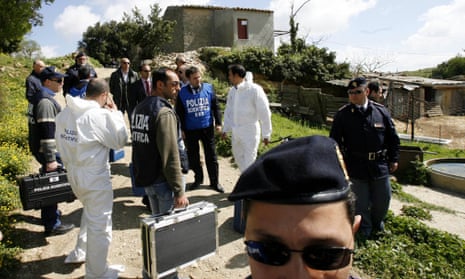How does one write a book in such an unwieldy field? One problem – apart from the obvious unmanageability of swelling bibliographies – is that “mafiological” literature is still beset by its original dilemma: is the mafia the set of codes of honour and family values we are accustomed to see at a Mascagni opera? Or is it the brutal reality of a criminal association whose only goal is the parasitical accumulation of wealth? One possibility is to keep in mind the old saying of Giambattista Vico: “myths have a public basis in truth.” What truth, then, lies at the heart of the mafia myths that the cultural industry has so gladly dispensed upon us? What social needs, what desires and fears are satisfied by mafia myths?
Sustaining these questions is my list of 10 books – some fact, some myth, and some both – that may help to navigate these murky waters.
1. Primitive Rebels by Eric Hobsbawm (1959)
Robin Hood in England, Janosik in Poland and Slovakia, Diego Corrientes Mateos in Andalusia, and the mafiosi in Sicily are in this book archetypes of the social rebel who took from the rich to give to the poor. It is unfortunate that the most powerful of mafia myths – the honourable bandit in shotgun and tights – took shape in the pages of one of the most scrupulous and fact-driven modern historians. The verdict is unanimous: Hobsbawm is guilty of mafia mythology. But then again, don’t we all wish for a world of equality and justice, in which someone – even a mafioso – can right wrongs and prove that oppression can be turned upside down?
2. The Day of the Owl by Leonardo Sciascia (1961)
A sunburnt Sicilian town reminiscent of Lordsburg in John Ford’s Stagecoach. A bus is about to leave the station when a gunshot is heard, leaving a body on the ground. The problem is that Captain Bellodi, in charge of investigating the crime, is no John Wayne – nor does Sciascia have any patience for western-style happy endings. The book remains one of the most engaging and thrilling detective stories ever written about the mafia – to avoid only if you have no tolerance for untidy endings.
3. The Godfather by Mario Puzo (1969)

Like Christ in Dostoevsky’s legend of the Grand Inquisitor, war-decorated hero Michael Corleone returns to civilian life after the second world war. Whether he should resist the temptation of organised crime, or yield to it for the good of the family, is the question Puzo borrows from Dostoevsky. The Godfather is a temptation of Christ for Nietzschean times – when the Don is dead, will-to-power affirms itself as a “yes!” to criminal life.
4. Mafia and Mafiosi by Henner Hess (1973)
First published in German in 1970, and reissued in 1998, this is the classic sociological work on the mafia. Hess is on a mission to debunk all mafia myths – its medieval origin, its masonic rituals, and, above all, the myth of the mafia as an organisation. Hess’s mafia is instead the un-organised yet dominant subculture of Sicily to which no Sicilian is extraneous. Unsurprisingly, the book was much hated in Sicily.
5. Global Mafia by Antonio Nicaso and Lee Lamothe (1995)
Sitting on the Advisory Board of the Nathanson Centre on Transnational Human Rights, Crime and Security at York University in Toronto, and with a personal history in the anti-mafia, Nicaso has understandably little patience for the myth of men of honour. With journalist and novelist Lee Lamothe, Nicaso writes this most informative book on the transformation of organised crime under the “the new world order”.
6. Excellent Cadavers by Alexander Stille (1996)
This carefully researched book reads almost like a novel. It would stand to reason, in fact, that only a novelist à la George RR Martin could possibly imagine the endless saga of grisly murders that happen on almost every page of this book. Credit for the gruesome plot goes to mafia boss Salvatore Riina, who made Westeros look like a holiday spa by comparison.
7. Gomorrah by Roberto Saviano (2006)

Saviano investigates the global and financial ambitions of organised crime in the age of neoliberalism. Reading Gomorrah, it becomes increasingly difficult to distinguish the logic of today’s mafias from that of global corporations. Beautifully written, Gomorrah is an example of that peculiar Neapolitan genre, the “essay-novel”.
8. Midnight in Sicily by Peter Robb (2007)
I have recommended this at times as a travel guide. The way Robb describes Sicilian landscapes and cities – most notably Palermo, “sacked” for roughly 30 years by mafia-led constructions and land speculation – is unequalled even by the “roughest” tourist guides.
9. Mafia Brotherhoods by John Dickie (2014)
Historian Dickie is a master storyteller – which is fortunate for the reader of this 800-page tome, whose pages turn very quickly. It is one of the few books I know that attempt to trace the exhaustive history not of one, but of three Italian criminal organisations: ’ndrangheta, camorra, and mafia.
10. Mafia and Antimafia by Umberto Santino (2015)
While the mafia has generated enormous public attention,
the antimafia – which, Santino tells us, is as old as the mafia – has a remarkably low profile. The founder and director of the antimafia Centro siciliano di documentazione in Palermo, Santino is poised to change all that with this timely history.
- The Mafia: A Cultural History by Roberto Dainotto is published by Reaktion Books priced £20. Buy it from the Guardian bookshop for £16.

Comments (…)
Sign in or create your Guardian account to join the discussion